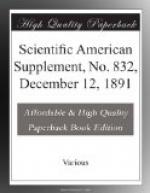If the modern hard-driven shipmaster would exercise greater care as to his health and habits, and would strive more after being a true master over his ship’s company, and this is easier to be gained by respect than fear, things would go on more smoothly, and when he did get away for a time from all the petty annoyances of shore, which are more especially felt in his home port, he would have a time of comparative comfort, would live longer and happier, and, possibly, escape the terrible attacks of nervous depression which have finished the career of many a too finely strung fin de siecle shipmaster. —Nautical Magazine.
* * * * *
ALFRED TENNYSON.
Alfred Tennyson, the poet laureate of England, was born at Sornersby, Lincolnshire, April 9, 1810, and was the third of a large family of children, eight of whom were boys and three girls. His father was a clergyman, a man of remarkably fine abilities; his mother, as should be the mother of a great poet, was a deeply religious woman with a sensitive spirit that was keenly attuned to the aspects of nature. It was from her that Tennyson inherited his poetic temperament combined with the love of study that was a characteristic of his father. Tennyson’s brother, Charles, superintended the construction of his younger brother’s first poetic composition, which was written upon a slate when the great laureate was a child of seven. Tennyson’s parents were people who had sufficient of this world’s wealth to educate their sons well, and Alfred was sent to Trinity College, where he as a mere lad won the gold medal for a poem in blank verse entitled “Timbuctoo,” which is to be found in all the volumes of his collected works, though many of the other poems produced in that period are not given place.
[Illustration: ALFRED TENNYSON, POET LAUREATE OF ENGLAND.]
His first volume of poems was published in 1827, and in them the influence of Byron, whom he passionately admired, is everywhere visible. In 1830 he issued another volume, which defined his position as a poet of great promise, but which was criticised by Christopher North with the most biting sarcasm, and which was held up to ridicule by the great Lockhart. More than ten years followed in which the poet wrote nothing, then he began a literary career which lifted him to the highest place in the literary world, a place which he has since held, and as a lyric poet he has never been equaled.
In 1850 he issued that most wonderful production in any language, “In Memoriam,” which has enriched the English language by hundreds of quotations and which in its delicate sentiment, its deep sorrow, its reflective tenderness, has been the voice of many a soul similarly bereft.
Had Tennyson never written anything but “In Memoriam,” his fame would have been assured, but “The Idylls of the King,” “Enoch Arden,” “The Princess,” and other great compositions will stand forever to his credit. Of Tennyson’s personal character much has been said and written. As pure and sweet as his poetry, beloved by a large circle of friends, active still in literary work, it may be said of him that he has always worn




